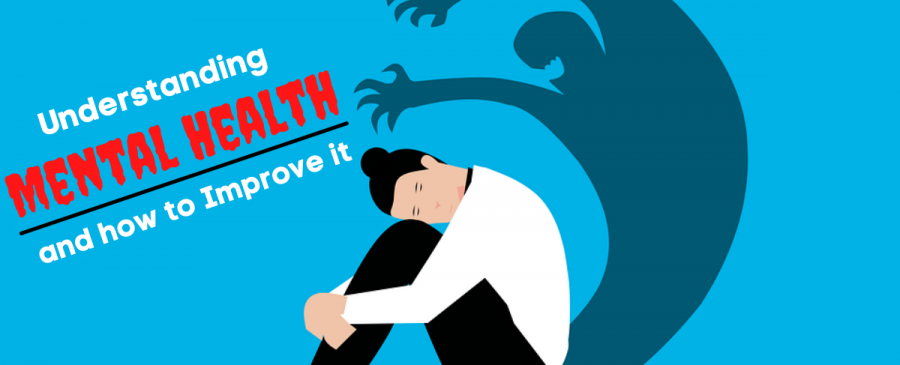Understanding Mental Health And How To Improve It

We have curated this blog, using the following resources, to provide you a general insight into Mental Health.
We ask you to refer to these excellent resources for a deeper understanding of this complex subject.
Mental Health Foundation https://www.mentalhealth.org.uk/
World Health Organization https://www.who.int/news-room/fact-sheets/detail/mental-health-strengthening-our-response
and of course never forget www.Mind.org.uk
The terms mental health and mental illness are sometimes interchanged but they are different. To the layperson definitions often seem to overlap and can be confusing but generally it can be differentiated by degrees/severity.
Everyone has "mental health". It refers to a person's cognitive, behavioural, and emotional wellbeing. It all comes down to how we think, feel, interact and cope on a daily basis. During our life time we may well suffer from Poor mental health.
"Mental Illness" encompasses a range of disorders, with different symptoms but they are not caused or cured by "factors" in someone’s life but they are likely to have a significant impact across many areas of a person’s life.
Poor Mental health may have an impact on daily life, relationships, and physical health.
According to the NHS just in the pandemic alone, there was a mental health crisis where helplines receive three million calls. https://www.england.nhs.uk/2021/07/nhs-mental-health-crisis-helplines-receive-three-million-calls/
Share this article to help the NHS drop these numbers dramatically and help spread the awareness of mental health.
What is mental health?
Mental health is a vital and necessary component of overall health. According to the World Health Organization's constitution, "health is a condition of complete physical, mental, and social wellbeing, not just the absence of sickness or disability."
“Mental health is a condition of wellbeing in which an individual recognizes his or her own strengths, is able to cope with typical pressures of life, is able to work effectively, and is able to contribute to his or her community.”
Mental health is critical to our collective and individual abilities as humans to think, feel, connect with one another, make a livelihood, and have fun. As a result, the promotion, preservation, and restoration of mental health may be viewed as a critical issue of people, communities, and societies all over the globe.
Why is mental health crucial for overall health?
Both mental and physical health are essential components of total wellbeing. Depression, for example, raises the risk of a variety of physical health issues, especially long-term illnesses like diabetes, heart disease, and stroke. In the same way, the existence of chronic illnesses might raise the risk of mental disease.
Is it possible for your mental health to alter over time?
Yes, it is critical to note that a person's mental health can fluctuate over time, based on a variety of variables. When a person's resources and coping abilities are stretched beyond their limits, their mental health may suffer. For example, if a person is working long hours, caring for a relative, or suffering financial difficulties, their mental health may suffer.
What factors contribute to mental illnesses?
Mental illness is not caused by a single factor. A variety of factors, such as age, might increase the chance of developing mental illness.
- Early adversity in life, such as trauma or a history of abuse (for example, child abuse, sexual assault, witnessing violence, etc.)
- Other continuous (chronic) medical problems, such as cancer or diabetes, have resulted in similar experiences.
- Brain biological factors or chemical imbalances
- Use of alcoholic beverages or medications
- Feelings of solitude or loneliness
Feelings and symptoms
Below are some of the more common feelings or symptoms linked with mental health problems.
- Stress
- Anxiety, fear and panic
- Low mood, sadness and depression
- Feeling lonely
- Grief after bereavement or loss
- Anger
- Loneliness in older people
- Signs of an anxiety disorder
- Hallucinations and hearing voices
- suicidal thoughts
- Self-harm
Read more about these feelings and symptoms here - NHS
How to improve mental health
It is essential to take care of yourself in order to get the most out of life. Here are some practical methods to take care of your mental health. Making little adjustments to your lifestyle does not have to be expensive or time-consuming. This advice is applicable to anybody.
These points are in no particular order. Some will be more or less relevant for different people and situations but why not be positive and begin today?
Resource - https://www.mentalhealth.org.uk/publications/how-to-mental-health
1. Ask for help
We are all fatigued or overwhelmed at times by how we feel or when things go wrong. If things are becoming too much for you and you believe you are unable to manage, get assistance.
Your relatives and friends may be able to provide practical assistance or simply a listening ear. Local services are available to assist you.
Where to get urgent help for mental health - https://www.nhs.uk/mental-health/advice-for-life-situations-and-events/where-to-get-urgent-help-for-mental-health/


2. Accept who you are
Some of us make others laugh, some are excellent at maths, some prepare great food. Some of us share our lifestyle with the individuals who live near to us; others live quite differently.
Take pride in who you are. Recognise and accept your weaknesses, but concentrate on your strengths. What you may see as a weakness others may see as a strength.
3. Keep in touch
Strong family connections and helpful friends may assist you in dealing with life's difficulties. Friends and family have the ability to make you feel included and cared for. They may provide perspectives that vary from what is going on within your mind. They can help you stay active, stay grounded, and address real issues.


4. Discuss your emotions.
Talking can help you deal with a problem you've been dragging around in your brain for a long time. Simply being saying things out loud might make you feel more supported and less alone.
It's not always simple to put into words how you're feeling. If you can't think of a single term, use several. What do you think it's like inside your head? What does it make you want to do?
You don't have to sit down with your loved ones and have a long discussion about your health. Many individuals feel more at ease when these talks happen organically - perhaps when you're doing something together.
5. Drink Sensibly
We frequently consume alcohol to alter our emotions. Some drink to cope with anxiety or loneliness, but the impact is just momentary.
Because of the way alcohol withdrawal influences your brain and the rest of your body, you feel worse when the drink wears off. Drinking is not a healthy method to deal with tough emotions.
Aside from the negative effects of excessive/regular alcohol use on your health, you need more and more alcohol each time to experience the same short-term high. There are better methods to deal with tough times. Having a drink isn't bad and can help lighten the moment but never believe it's going to "help" solve anything, it won't.


6. Keep active
Experts think that exercising causes your brain to produce hormones that make you feel happy. Regular exercise may improve your self-esteem as well as your ability to focus, sleep, and feel better.
Exercise also maintains the health of your brain and other important organs.
According to experts, most individuals should exercise for 30 minutes at least five days each week.
Make physical activities that you love a part of your daily routine.
So the bottom line is. Everyone during there life will have variations in their mental health. There are simple ways to help manage these changes, which generally revolves around not bottling them up and pretending nothing is wrong.
BUT what is extremely clear that sometimes it's not possible to manage your mental health and it's actually an illness. This is where professional help must be sort because it's not a weakness ... it's an illness.
For more tips on how to look after your mental health be sure to visit our resource, they also provide a downloadable pdf. https://www.mentalhealth.org.uk/publications/how-to-mental-health
 MyTeamSafe
MyTeamSafe